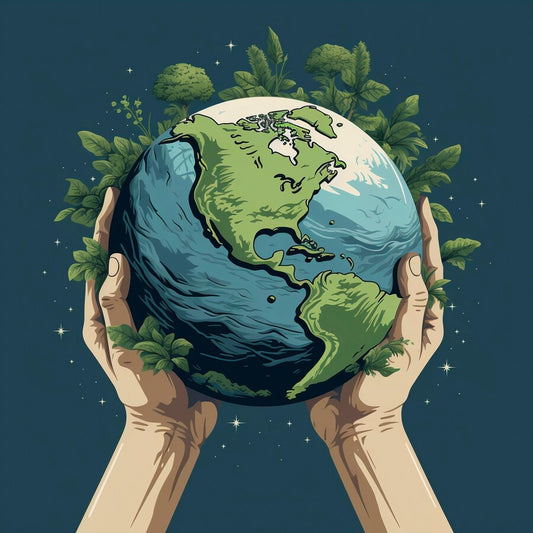Ever wondered where the phrase “Robbing Peter to pay Paul” came from? Neither had I until today! One theory is that in medieval times, churches often faced financial challenges when the dedication of funds to one saint or church project might result in a shortage for another. So church authorities would sometimes transfer funds allocated for one saint (symbolised by Peter) to support another (symbolised by Paul). This practice of reallocating resources to meet immediate needs seemed to solve the problem but just screwed up things elsewhere and hence the idiom was born.
I find myself down this rabbit hole because I was trying to think of idioms that summed up the issues often faced in making fashion sustainable. How you make one choice but it ends up just creating new problems elsewhere.
Cotton and Organic Cotton is a good example of this. In my last blog, we looked at why traditionally grown cotton was bad for the environment. And we touched on why Organic Cotton was better.
But it’s not perfect. As with robbing Peter to pay Paul, there are trade-offs when picking organic cotton. Here we look at the good, and the not so good, of organic cotton.

The Good
-
Healthier Planet - this one is obvious. With no chemicals used organic cotton is way better for our planet. The soil is healthier. There is greater biodiversity as everything from insects to bees to birds (and us!) are not exposed to these harmful chemicals. And water contamination is reduced as there is no chemical run-off.
And given the scale of chemical usage in the growth of non-organic cotton - it uses only 2.4% of the world’s cultivated land but a massive 6% of the worlds pesticides and 16% of its insecticides according to the Environmental Justice Foundation - the impact of switching to organic cotton for our planet is HUGE!
-
Better for workers - one of our 3 sustainable values at Stix is clothes that are ethically made. It’s not healthy or right that Workers, whether they are picking the crops or working with the raw materials, are being exposed to pesticides and fertilisers.
I’ve found various stats online but this one really got me - of the top ten fertilisers used on non-organic cotton crops world-wide 3 are categorised as carcinogenic. They can literally cause cancer. No T-Shirt, Jumper, Trousers or any other piece of clothing is worth this!
-
Less Water (probably) - this is contested, but I’ll present the positive side first. Organic crops tend to be grown on smaller farms, and often therefore in more naturally rain fed areas - up to 80% by one count. And as no pesticides or fertilisers are used, less water is needed. Water is becoming scarcer and scarcer as climate change accelerates - anywhere we can save water is huge and organic cotton could play a role in this.

The not so good
-
Does it really use less water though? When I started writing this blog I came across a lot of stats about how organic cotton had a lower carbon footprint and used way less water than conventional cotton. Primarily these articles were citing a 2014 study by The Textile Exchange, which claimed that organic cotton used 91% less water and had a 46% smaller carbon footprint than non-organic cotton. But this has been challenged - check out this article in Forbes for example.
So we can’t definitely say that it uses less water. I think it probably does due to who tends to grow it (small scale farmers) where they grow it (rain fed environments) and the fact it doesn't need water intensive chemicals. But I can’t be 100% certain on this. So the water issue is a bit of a grey area!
- It also needs land (and a lot of it). Remember I have mentioned the issue of sustainability not being simple? How, just like the old idiom of Peter and Paul, is there often a trade-off? Land is the best example of this. You still need land to grow organic cotton, and a lot of it. And because of how, by design, chemically driven cotton cultivation is so efficient compared to natural cultivation, organic cotton will need more land than non-organic cotton. This is in a time of global climate change and an ever increasing global population where land and water scarcity will only increase. It’s a major drawback.

So Is Organic Cotton better than Cotton?
I started off this article talking about robbing Peter to pay Paul. Organic cotton vs non-organic cotton is in some ways a good example of this idiom - the trade-off between the two is not perfect. It’s not black and white.
But at Stix we think it’s as close as we can get right now. I’m no scientist but I will take something that doesn’t use harmful chemicals including known carcinogens over one that does all day! Even if that’s the only advantage I think that’s a massive win - healthier soil, healthier water, healthier workers and more biodiversity are all wins.
Yes there are issues. It is not perfect. And we need to acknowledge those and continue to seek out alternatives.
But if we wait for perfection we will never get anywhere. We will never make change. It’s better to do something than nothing. This is the philosophy that underpins everything we do at Stix.
And right now, given the options, Organic Cotton is better for our planet than conventional Cotton.




